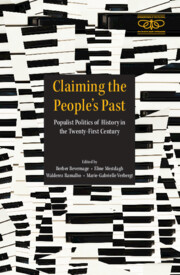Book contents
2 - Memory Policies and Uses of the Past during Kirchnerist Governments in Argentina (2003–2015)
Published online by Cambridge University Press: 15 May 2024
Summary
Introduction
Rightly or not, the governments’ engagements with memory policies are often met with a shadow of suspicion. Victims’ associations, intellectuals, and activists from different parts of the world tend to warn their publics of possible abuses of memory and manipulations of the past made by political leaders. Argentina, with a dense history of mobilization around its dictatorial past, is no exception to this rule. During the administrations of Néstor Kirchner (2003–2007) and Cristina Fernández de Kirchner (2007–2015), the discussion about the role played by the state in public remembrance was subject to much contention.
In this chapter, we focus on the way Kirchnerism engaged with the memory of the repression and forced disappearances that took place during the last military dictatorship (1976–1983). Our goal is to analyse Kirchnerist governments’ involvement in public remembrance by considering the main aspects of their narrative together with the political–institutional approach they unfolded towards memory.
In the Argentinian public debate, the discussion concerning Kirchnerist engagements with the past has so far been dominated by a dichotomous approach that swings from considering Kirchnerist uses of the past as illegitimate ‘appropriations’ to considering their engagement as a sort of automatic ‘enshrinement’ of the human rights movement's claims into the national state. We will argue that, instead, we should understand the dominant Kirchnerist memory frame in Argentina as an outcome of an ‘articulation process’ between the government and the human rights movement, formed by an ensemble of heterogeneous organizations that had historically led the struggle for memory and transitional justice in the country. As suggested by Laclau and Mouffe (1985), by ‘articulation’, we do not merely mean an alliance between two preformed entities, but rather a mutual constitution where both the Kirchnerist movement and the human rights organizations (HROs) were transformed in time. As we will argue, this articulation made it possible for memory and human rights to become an object of public policy in an unprecedented way for Argentinian democracy.
Following Laclau (2005a), we adopt a formal approach to populism. According to this perspective, a movement or government is not ‘populist’ because of its ideological contents but due to a specific logic of articulation of contents, whatever these may be.
- Type
- Chapter
- Information
- Claiming the People's PastPopulist Politics of History in the Twenty-First Century, pp. 49 - 65Publisher: Cambridge University PressPrint publication year: 2025

